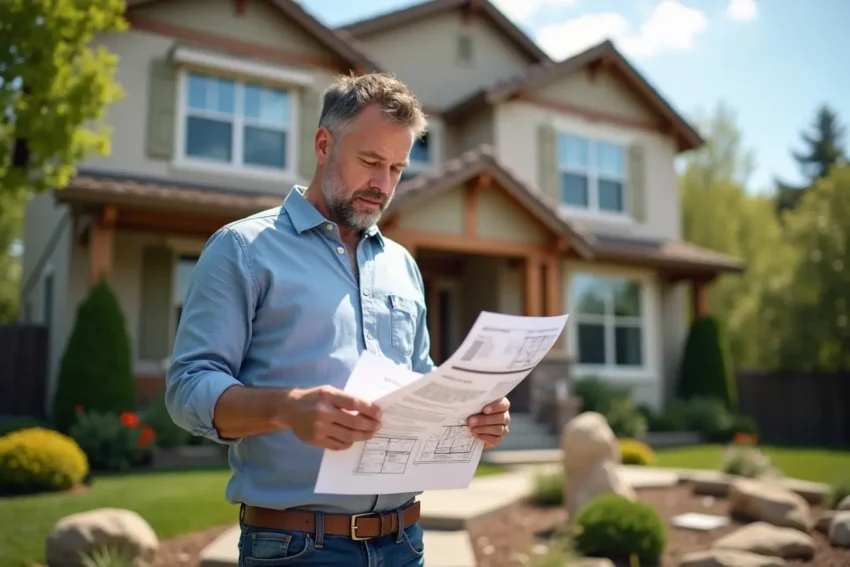Can You Skip Permits when Doing Upgrades Outdoors

What if you’ve already poured the concrete and bolted the posts in, but you forgot to check if you need a permit for whatever you’re doing? Are you in trouble? You didn’t think this was a big project, and you wouldn’t have even thought about a permit if your neighbor didn’t randomly mention it.
So now what?
You didn’t start this intentionally, trying to bypass rules; it just happened. You were excited, saw a YouTube video, and decided to give it a go. And you could add a little roof over the patio over the weekend, so what’s the big deal?
And you’re right. You can build it, but that’s not the real question. The real question is what if you go ahead with building without asking permission first, because this is where people get blindsided. Imagine a home appraisal or an injury lawsuit that has the words’ unpermitted structure’ in it.
Yikes.
You shouldn’t be afraid or permitted, but you do need to understand what you risk when you skip them.
Contents
Why Outdoor Structures (Usually) Need Permits in the First Place
A lot of people think that permits are nothing more than paperwork that slows everything down, but that’s not really the point.
But, permits exist for a reason.
Think about it – why do we need the permits in the first place? Just so that we end up paying more taxes? Sure, you can look at it that way, but what do you need to get a permit in the first place?
You need:
- Site plans
- Construction drawings
- Engineering details/calculations
- Cost estimate
- Project description
- Contractor info (if you’re hiring someone to do it)
- Zoning approval
- Utility info (electrical, plumbing, gas)
And then there’s the permit application form and the fee.
To get all of the listed documents/info, you need to do a lot of work. And based on any one thing from that list, your permit application may be denied. This means that the entire project needs to be legal and it needs to be safe.
Those two are the prime reasons you get a permit when building things.
Outdoor structures can affect a lot more than just how your yard looks because, if a deck isn’t built to hold enough weight, someone can get hurt. If you don’t attach a pergola properly, it can come off in a storm, and then you’ll have a lawsuit on your hands. In short, permits are here to make sure the structure is safe and legal, not just pretty.
So, where do things get messy, you ask?
Problems start with people assuming that anything they do outside is ‘casual’ and doesn’t need to be approved. And that’s how they end up building full decks and retaining walls without realizing that they all needed to be inspected and approved.
It’s the same with roofed and enclosed porches, sunrooms, electrical outdoor kitchens, etc. A lot of people (often) skip steps like these because they assume it’s simple enough to DIY.
If your porch is riddled with mosquitoes every evening, instead of looking up ‘screened porch builder near me‘ online to find a professional to screen the entire porch, you might decide to throw some measurements on paper, go to Home Depot, and try doing it on your own.
And sure, if you’re experienced enough, you could do it successfully.
But people forget that willpower alone will get you only so far – you need skill/experience, you need tools, you need time, and at the end of the day, all of this still costs you money; it’s not like it’s free.
Of course, rules change depending on the state, but there’s still no place where you can freely build structural add-ons without the city clearing it first. To be clear, not everything needs a permit, so you can paint a bench or put up a small prefab shed just fine.
But if it’s a project that you’d be upset to lose someday or pay to rebuild, it’s most likely something the city wants to know about first.
What Can Go Wrong if You Purposefully Skip a Permit
Skipping permits doesn’t necessarily have to backfire right away, and you might even get away with it for a good while.The thing is, problems usually surface later, when you try to sell the house or file an insurance claim.
Here’s what happens when you don’t play by the rules.
Fines!
If found out, the city can fine you a lot for unapproved construction; what’s worse, you might also be forced to tear the whole thing down.
There’s not much to say about it. It’s the prime reason to get a permit, plus getting fined for anything isn’t fun. And you can be sure such a fine will be way more than a parking ticket.
No Insurance Coverage
Insurance companies don’t have to cover damage to something that wasn’t legally built.
So, if your illegal deck collapses or the outdoor kitchen starts a fire, whoopty do. They’ll deny the claim, and you’ll be the one handling all the repairs and legal costs. And do you want to know the most tragic thing?
Most homeowners don’t even find this out until after the damage happens.
Legal Risk if Someone Gets Hurt
If a guest or a tenant gets injured while using the space that wasn’t legally built, you can be held responsible. Without permits, there’s no record that the structure was safe or up to code.
Even a minor injury can become a lawsuit if the lawyer points out that the project was never approved.
Issues When Selling
Appraisers will determine the value of your property based on what’s on the official records. If there’s something different from the official records, you have a problem. If you have something added onto the property, this won’t be included in the overall property value. And if you have something removed (e.g., a wall during renovations), this will also negatively affect the property’s value.
And you can’t simply go and get the legal papers needed to make the change official, because you never had a permit to do that project in the first place. Which means, you might end up either with a fine before being allowed to legalize, or you might be instructed to demolish the extra structure or build back that wall you removed to expand the living wall, but it turned out that wall is important for the structural integrity of the entire house.
If buyers are using bank financing, they might be straight-up scared off because of such discrepancies.
Conclusion
If you ever build a structure without a permit, it’s constantly going to be at the back of your mind, nagging you, leaving you to wonder whether you’ll receive a fine tomorrow, or if you decide to sell, how much of an issue that’ll be. And every time you look at the structure, it’s going to be a reminder of that.
Sure, permits are annoying; no one is going to argue that. And yes, they slow everything down.
But if you imagine having to rip the entire thing out because the jurisdiction found out and they weren’t exactly thrilled about it, then that permit doesn’t look ‘that’ bad.
Nothing good can come out of building a structure without a permit. Yes, permits are annoying, and they can slow you down, but imagine having to rip the whole thing out because the city found out what you did and they weren’t happy about it.
You can build almost anything you want, but don’t build yourself into a corner.
Shortcuts (oftentimes) aren’t worth it.



